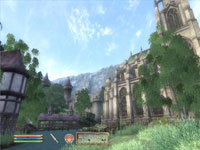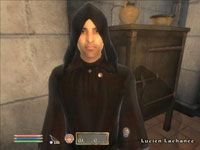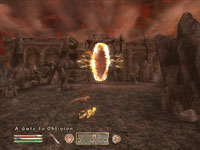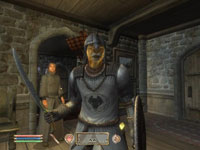
Living In Oblivion 296
The Elder Scrolls series is well known among PC gamers as the high water mark for an open-ended RPG experience. The series, set in the world of Tamriel, has a staggering breadth and depth thanks to the exacting standards of the team at Bethesda Softworks. The newest title in the line brings Tamriel to life in a manner that is renewing the faith of even the most jaded CRPG player. Elder Scrolls IV: Oblivion may not be the perfect game for everyone. For those willing to give it a shot, Oblivion treats gamers with a level of respect that is unique, uplifting, and (hopefully) inspirational for game developers in all genres. Read on for my impressions of a truly unique game.
- Title: Elder Scrolls IV: Oblivion
- Developer: Bethesda Softworks
- Publisher: 2K
- System:PC (360)
This latter category of CRPG is, regrettably, on the wane. The type of gamer who enjoys this genre has been drawn away by the promise of multiplayer interaction, either in MUDS or MOOs or in their more graphically advanced MMORPG offspring. Since the days of Baldur's Gate and Planescape: Torment fewer and fewer of these non-linear titles, with an emphasis on creating an actual role to play, have been lining shelves. The grandaddy of this genre is the previous chapter in the Elder Scrolls saga. Morrowind let you loose on an island nation with little more than a race, astrological symbol, and some skills. Once you were in the game there wasn't a single constraint on your actions. An advanced world editor ensured that a player who tired of the hundreds of hours of potential gameplay in the shipped title could download content from his fellow gamers. From the smallest item all the way to entire additional continents, this content has kept dedicated players busy since the game's launch in 2002.
These players can move on, finally, as Oblivion steps ably into its older brother's very big shoes. The level of polish this game displays is such that it is hard not to wander into hyperbole when describing what they got right. In point of fact, it's hard to nail down something they got wrong when keeping the genre as a whole in mind. There are, however, some big obstacles to enjoying the game. The most daunting can be a simple question of technology. A lot of game impressions seem to be based on the Xbox 360 version of the title, and for good reason. The 'recommended specs' on the side of the PC box could make anyone pause. A three gig processor, at least a gig of memory, and (if you're using Nvidia as your yardstick) a 6800 or better graphics card are what they suggest. I'll be honest, I don't reach the recommended specs. I've got a 2 gig processor and a 6600 card. Anticipating the game, I did upgrade to 2 gigs of memory as a stopgap measure, and I really noticed that purchase in the lightning-fast load times. Graphically, though, I know I'm not seeing the full experience. Unless you have a high-end rig, you're probably going to want to go with the 360 version. I'm told it has noticeable load times and some occasional control frustrations, but if your computer can't handle the title at least you can play the game.
The second roadblock potential players might encounter is one of the game's biggest strengths: the open-ended gameplay. Once you've finished the tutorial dungeon you're let loose with absolutely no strings attached. Tamriel is your world to explore, and you can do it however you wish. There is about 100x more direction in Oblivion than there was in Morrowind, and various gameplay elements make it much easier to get where you're going and know what you're doing. Just the same, if you like having a clear goal the freedom of Oblivon may throw you. The entrants in the Final Fantasy series look like barely interactive movies in comparison.
Finally, an aspect of the title that's throwing even dedicated players may prove to be the final straw for folks new to the series. There's no other way to say it: Oblivion is harsh. With freedom comes consequences, and for a certain kind of player Elder Scrolls IV may be a very frustrating experience. The best example of this philosophy is in character creation. It's entirely possible to create a useless character if you make the wrong choices. They give you an array of pre-generated character roles to choose from, and it's hard to go completely wrong if you pick one of those. If you so choose, however, you can roll your own class. If you really want to, you can set off into Tamriel with little or no experience in wielding a weapon. Oblivion is far more than your usual hack-and-slash, but there is still a lot of combat in the game, and such a character will probably have a very hard time of it. That combat, too, can be brutally unforgiving. Enemies throughout the land scale as you gain in strength, so the hope is that you won't ever come up against an opponent that's completely out of your league. Within your 'league', though, you can come up against enemies that are almost impossible to defeat. That can depend on the character just as much as the enemies involved, and either way the game isn't going to sit there and hold your hand.
With those caveats out of the way, I'll engage in just a little bit of hyperbole. Oblivion is the most engaging RPG I have ever played. It captures the essence of what makes tabletop roleplaying so enjoyable, and allows you as the player access to a sprawling and beautifully realized world of possibilities.
From the first moment you enter the world, the occupant of a dank jail cell, you'll be struck by the depth of the experience. A fellow prisoner makes rude comments to you from across the hallway, and the guards which appear at your door make no bones about their willingness to kill you. They're there guarding the emperor, who is fleeing an assassination attempt. Your tutorial for the game has you following the emperor (voiced by Patrick Stewart), and exploring a small cave system beneath the Imperial prison. Game elements are well explained, with numerous opportunities to practice combat tactics, stealth, and spellcasting. By the time you leave the cavern, you'll have chosen your race and class and borne witness to the death of the empire's leader. Blinking in the sudden light, on a grass-covered hill outside the Prison walls, you have a quest in your journal and a million options open before you.
This sense of freedom is Oblivion's most engaging quality. While the emperor asked with his dying breath that you travel to a Priory in the north and find his illegitimate son, you are under no obligation to do so. Ever. There is enough to do in the world of Tamriel that if you so choose you can spend the rest of your play experience happily ignoring the looming threat implied by the main quest. The main quest is well-written, and if you follow through with the line's goals you'll be rewarded through fame and fortune. Unlike other titles with the implication of 'freedom', Oblivion really does offer far more than just the central script. Just walking down a street in one of the many cities of the empire will allow you to overhear the possibility of adventure. The Non-Player Characters (NPCs) of Oblivion are wonderfully written, and all have their own very specific needs. Their AI puts them through a normal routine every in-game day, and causes the characters to interact in very realistic ways. While a peasant's normal day might involve working in a farm outside the city, stopping at a tavern for a meal, and then heading home for bed, it's possible that could be disrupted by the actions of another character. If it is, you can bet that there's a quest waiting for you.
This level of depth is supported by the game's many conveniences. The number of quests the citizens of Tamriel will throw your way would make it impossible to handle if you didn't have a good level of support. The game offers a featureful quest journal, which not only shows what quests you're on, but quests that you've completed and prior steps to ongoing quests. Quest goals are clearly marked on your world map, ensuring that even if you are unsure of what exactly to do you can always know where you're supposed to go. The game features a 'fast travel' system that can take some of the tedium of overland riding out of the game. If you do choose to travel overland, you'll encounter new adventure locales and opportunities for questing, but the option of moving quickly from place to place is really nice.
What you actually do on quest is extremely varied. While there are some quests that fit into the usual 'kill the x for me' or 'deliver this to so-and-so', a surprising number of them substantially differ from the norm. There are diplomatic missions, like the request from the invisible people of Aleswell. An entire village turned translucent by a thoughtless wizard wants you to go talk him into turning them back. The Thieves Guild quests primarily revolve around entering private areas and coming away clean with an item or items. One involved quest line I explored had me following around a merchant, who turned out to be purchasing his wares from a graverobber. While the quest line did end in a confrontation with the scoundrel, there was far more to the quest than simply 'go here and kill the bad guy'. Quests in Oblivion are deeply satisfying in a way that many RPGs (especially MMOGs) can't even approach.
All that said, if you're not in the mood for considered action there's always monster hunting to lighten the mood. Ruins are scattered liberally across the empire, and exploring them will lead you into numerous combat situations. Combat in Oblivion shares the same first-person melee setup that Morrowind used. You hack and slash at your foes from behind your character's eyes, resulting in an immediacy to combat that raises the blood pressure quite effectively. There are several ways to fight, each with its own distinct 'feel'. Melee combat has a great kinesthetic feel, with your character swaying and moving in time to the action. Slashing your weapon across your field of view is enormously satisfying, and creatures bleed profusely when poked. Melee skills have been simplified a great deal, with 'Blade', 'Blunt', and 'Hand-to-Hand' constituting the three main options you have in this field. If ranged combat is your preference, 'Marksman' is the skill you'll want. Drawing an arrow on a bow conveys a real sense of power, and the whistling sound that accompanies a flying projectile imparts your shots with a deadly beauty. Ranged combat is most useful, I've found, to use when stealthing. Entering 'stealth' mode allows you to move quietly and unseen through the halls of the dungeon. If you can get off a shot with your bow or blade while remaining undetected, your initial blow will do far more damage. You'll be doing a lot of combat throughout your adventuring career, so the fact that they just nailed the feel of chaotic encounters makes it hard to get bored while exploring the depths.
Every system, in fact, has the mark of quality stamped upon it. Magic is just as engaging as the combat elements, with different schools covering a wide variety of spell effects. Spells are broken out into separate schools, which don't directly tie together. You can choose, for example, to improve your ability to cast healing spells and ignore other spellcasting elements. If you want to broaden your scope, the different schools can be used in synergy to create excellent effects. Magic schools, sneaking, bladework, and shield blocking are all covered by skills which improve as you use them. 'Leveling up' occurs when you've crossed a certain threshold of skills points acquired. Your increase in power (both via level and skill increase) is visible and enjoyable, with benefits to your prowess in battle immediately apparent during gameplay. There are also non-combat skills, which are just as well thought out as the more violent sort. Lockpicking and Speechcraft are mini-games, and both allow access to secrets you might not otherwise ever see. You can repair your armor or brew potions, as you'd like. You can leap from rooftop to rooftop to improve your Acrobatics, and haggle with merchants to improve Mercantile. The tapestry of skills works so well because not only do they hang well separately, they mesh together into a cohesive whole. Your character, as your window into Tamriel, manages to be just as interesting as the NPCs around you. You can actually find that you surprise yourself with what you can do, a truly rare treat for any game.
All of these well-crafted systems would be fun even if the game only looked 'okay.' What makes Oblivion so easy to lose yourself in, though, is the visual quality and audio presence the designers have lovingly applied to the entire experience. NPCs look at you with expressive eyes and delicate features. Enemy creatures attack with movement appropriate to their style of combat, and light winds stir the grasses around you while you sit and stare up at the beautiful sky. Tamriel is a gorgeous world, and the visual experience completes the powerful force pulling you into the gameworld. There are a lot of 'wow' moments, but what I enjoyed most about the graphical presentation is that after a time you just stop noticing it. Everything looks just right, and makes it easy to slip into your alternate persona.
There's just so much right about this game, it makes me actually a little sad. The strong statements made by the developers are entirely admirable: a harsh and open world where the player is empowered. Those same statements will put off a lot of gamers because we are just not taught to expect much of ourselves when we game. The power, beauty, and depth of this gameworld should be experienced by as many people as possible, and because of the bad lessons taught by other games there are a lot of people that are going to say 'that's not for me'. Oblivion is a game that forces you to make decisions with real consequences, a game that plays out those consequences on the world, and teaches you as the player to think fast and play for keeps. It's real life, packaged into a fantasy format and with a handy quest journal that I constantly find myself missing as I do chores around the house. It does what other games are afraid to do: it respects you. The finest compliment for a game that allows you to fill a role is to find yourself actually believing the role, and Bethesda has given you every tool you need to go off and be your very own hero. In an escapist niche of an escapist hobby, there's not much more you can ask for than that.




Sir Sleepington (Score:3, Interesting)
Worst part: (Score:5, Interesting)
Fights never get easier, or harder, as you level. Everything becomes more powerful as you become more powerful, ensuring you come out of a fight exactly the way you did in earlier levels. Good for balance, extremely poor decision for conveying to the player that they are getting stronger.
Thankfully there are mods out that fix this. It truly is a spectacular game, the current pinnacle of the genre. The downside is that this perfection only causes the poorly made decisions to sting stronger.
Nothing revolutionary here (Score:2, Interesting)
Re:Nicely polished game (Score:1, Interesting)
Morrowind (Score:3, Interesting)
Not only that, but the exact same problems are still present. People are still resorting to leveling by just standing there and repeating actions. Crashing is still a huge problem. Balance is still screwed, only now, you don't have the respite of becoming more powerful than your enemies.
It sounds like they've only fixed one or two of the issues with Morrowind: rigid NPCs, annoying travelling, and underpowered magic spring to mind.
I loved Morrowind. Spent months in it. I might do the same with Oblivion in a few years, late to the party just like with Morrowind, after they've patched all the needless crashing, and the hardware requirements become realistic to the current generation. And once the community has stepped in with mods to literally finish the game on Bethesda's behalf.
But I'm not buying a 360, and I don't run Windows, so maybe I'll just continue to run Morrowind on my Xbox. You can have mods on Xbox if you want to badly enough, by the way. Not likely to happen on thge 360.
I don't get it... (Score:4, Interesting)
Take a look at the screenshots. Oblivion doesn't look fantastic now. It's starting to get to the point of looking decent, and actually looks fairly good on a couple points, but overall it's still the same ugly 3d graphics games always run. The shadows and lighting are all wrong. The characters still have textures that are all muddled, unrealistic and ugly.. they seem to ignore fine detail and just make crude smudges in a lot of places.. hair is particularly bad. Many edges and creases, mainly in armor, look painted on, badly, rather than actually creased. There are still many angular and blocky 3d bits in there.
Morrowind had problems with clipping, the characters were angular and blocky, the textures were a horrible blur, the shading and lighting were all wrong, and hard things like armor would flex and move like a second skin. All I heard at first was how fantastic and wonderful the graphics were. Then I looked into visual mods and found folks that agreed that it was ugly. They put out mods that improved it, in some cases a lot, but it was still ugly.
The gameplay was something I heard everyone raving about as well. I loved the mechanic of use it to gain in skill, and the flexibility of character development and creation. That was great. I loath with an undying passion the fact that the world is so static. Nothing your character does seems to matter. Kill a god? So? Take over as head of a guild? So? You don't get into any secret meetings with the big powers, you don't get any political intrugue and planning, you can't make choices that shape and direct others and reshape the land. What can you do? Kill stuff, steal stuff, and play fetch. Good dog.
Take for example a minor side quest of saving someone from a bunch of slavers. You rescue them and reunite them with their husband. Great, a nice quest. Quest over, go away now. Wait.. what? Where do they live? Do they need an escort home? Once there, will they be greatful and help you out in some way, information or gold, or perhaps just a place to crash away from the inn? Interaction and consequenses.. these are the heart and soul of an RPG. Morrowind had next to none of these.
The sound I loved. The background music was enjoyable, and it added a lot to the game. Except for the winds. I wanted to icepick my ears so I wouldn't have to listen to that annoying wistle in the winds anymore.
Oh, now for a note of realism (Score:3, Interesting)
The reviewer is gushing with love for Oblivion and that compels me to counter with a harsher review.
First the hardware requirements. I got 2.6 HT P4 overclocked to 3.1 and a Radeon 9800 Pro 128mb and 1 gig of mem and a fast HD. The game is certainly playable although it helps a lot if you turn grass off. Not all of the settings can be maxed BUT you can leave the land distance maxed AND have distant buildings drawns. So the outside still looks damn fucking big with trees all the way to the horizon and that distant city clearly visible.
I upgraded to a ATI X1600 Pro 512MB (agp version because I don't want to upgrade a complete PC until AMD upgrades memory) and the difference is noticiable.
BUT not staggering. The CPU is the limiter it seems and you notice it when panning outside that it is still not fluid. But it looks beautifull, I never worry to much about high frame rates in non-shooters and I wouldn't buy a 360 if it came with Brooke Shields (Blue lagoon edition).
For those who care about fps, you need a state of the art machine. For the rest, a quality machine of the last 2 years is passable.
Frankly the game to me seems to a mismatched bundle of ideas. It marries FPS with Melee. It has stealth ALA Thief but no instant kills. It has lots of potions and spells but only 8 slots to quickly use them in. It has friendlies wich conflicts with lots of friendly fire.
RPG's are pretty rare and everyone that is not crap is welcome and Oblivion is not crap. It just isn't a Baldur Gate either.
The combat is boring and confusing with more time spend running after your opponent the actually doing battle. I want to re-enact the scene from the Princess Bride ontop the cliffs of despair. Oblivion gives me a drunken scuffle.
Worse is that when you finally get people/horses to help you out you more often end up hitting them then the enemy causing them to attack you. Was this playtested or did the designers really enjoy beating up their own horse instead of the clanfear lizard thingy?
The magic is boring. None of the spells do it for me. Yeah you can combine some but whoopee. 3 boring spells in one is not 3 times the fun. Oh and you can't be a true mage when you got only 8 hot slots for your weapons spells and potions.
Alchemy is very detailed. NOT. Sure sure you got loads and loads of ingredients BUT they do not make sense. Each item just got 4 effects attached seemingly at random and you combine two or more to get a potion with 1 or more effects. Yet it is not logical. You do not combine grapes with yeast for instance to get wine to give you a confidence boost.
Everquest 2 at least did associate some logic behind wich foods give wich effects. Not Oblivion.
Since I need my hot slots for weapons and spells I do not bother with potions.
Then there is the sneaking. The stupid placing of the light gem thingy is indeed truly stupid. In the center of the screen. Probably afraid you would miss it. It has none of the shading of thief. you seem to be either invisible (you can hit an enemy with a sword and they won't see you), sorta invisible until you hit someone and fully visible. At least your state of visibilty is related to the darkness of your surroundings.
The bad thing however is that you do not have an instant kill. So if your sneaking up to an old harmless woman sleeping peacefully and whack her with a deadric (big sword) long sword be prepared for a long fight.
A bit of background banter in the Dark Brotherhood (assasin guild) has an NPC saying how he had to keep hacking and sawing at a woman's neck, I know what he is talking about.
A silent assasin only works if he/she can kill with one blow. What i